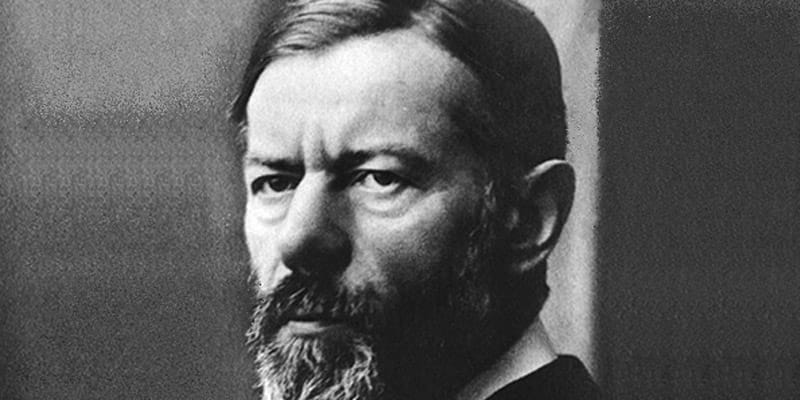Max Weber (1864-1920) fue un sociólogo alemán, filósofo y teórico de la gestión científica. Junto a su gran trabajo en sociología moderna, también se hizo famoso con su enfoque de gestión científica sobre la burocracia y su teoría sobre esta.
Biografìa de Max Weber
En 1882, Max Weber se matriculó en la Universidad de Heidelberg, además de ser un abogado junior, aprobó en 1886 el examen de Referendar (examen legal final). En 1889 obtuvo su doctorado en derecho escribiendo una disertación sobre historia legal.
Después de sus estudios de derecho, Max Weber se unió a la facultad de la Universidad de Berlin para dar conferencias y consultar al gobierno. Además de eso, tenía un interés particular en la política social contemporánea. Entre 1888 y 1890, Max Weber se unió a Verein für Socialpolitik para cumplir una función de investigación económica (estudios estadísticos), principalmente para encontrar soluciones a los problemas sociales de la época.
En 1980, Max Weber estaba a cargo de un gran estudio polaco de afluencia y migración. Los resultados finales de esta investigación generaron atención y crearon un punto de partida para su carrera como reconocido científico social.
En 1893, Max Weber se convirtió en miembro de Alldeutscher Verband (Liga Pan Alemana) y dio conferencias provocativas en las que critico la inmigración de los polacos.
En 1894, Max Weber se mudo a Freiburg y se convirtió en profesor de economía en la Universidad de Freiburg. Su investigación en ese periodo todavía se centraba en la economía y la historia jurídica.
En 1899 tuvo que dejar su trabajo como profesor y retirarse de los cursos porque padecía depresiones e insomnio. Esto se debió a una pausa en el trabajo y un viaje a Italia que duró hasta 1902. Trató de enseñar nuevamente pero necesitaba retirarse en 1903 y no regresar hasta 1919 (enfermedad mental).
Comenzó a enseñar nuevamente en la Universidad de Munich. En este tiempo creó obras importantes como Historia Económica General, Ciencia como Vocación y Política como Vocación. Esto creó muchas turbulencias porque muchos colegas y estudiantes no estaban de acuerdo con sus opiniones y declaraciones sobre la Revolución Alemana.
Max Weber murió en 1920 durante los efectos de la neumonía. Se le considera el padre de la sociología moderna, junto con Karl Marx y Emil Durkheim.
Citas de Max Weber
- “A science which attempts the interpretive understanding of social action in order thereby to arrive at a causal explanation of its course and effects.”
- “Power is the chance to impose your will within a social context, even when opposed and regardless of the integrity of that chance.”
- “Culture is a finite segment of the meaningless infinity of the world process, a segment on which human beings confer meaning and significance.”
- “The ethic of conviction and the ethic of responsibility are not opposites. They are complementary to one another.”
- “It is not true that good can only follow from good and evil only from evil, but that often the opposite is true.”
- “Laws are important and valuable in the exact natural sciences, in the measure that those sciences are universally valid.”
- “Every type of purely direct concrete description bears the mark of artistic portrayal.”
- “The fully developed bureaucratic apparatus compares with other organisations exactly as does the machine with the non-mechanical modes of production.”
- “All the analysis of infinite reality which the finite human mind can conduct rests on the tacit assumption that only a finite portion of this reality constitutes the object of scientific investigation, and that only it is important in the sense of being worthy of being known.”
Publicaciones y libros
- 2015, 1919. Politics as a Vocation.
- 2009. From Max Weber: essays in sociology. Routledge.
- 2009. The theory of social and economic organization. Simon and Schuster.
- 2002. The Protestant ethic and the spirit of capitalism and other writings. Penguin.
- 1994. Weber: political writings. Cambridge University Press.
- 1981. General economic history. Transaction publishers.
- 1978. Economy and society: An outline of interpretive sociology. Univ of California Press.
- 1968. On charisma and institution building. University of Chicago Press.
- 1968, 1953. The Religion of China, Confucianism and Taoism.
- 1958. Science as a Vocation. Daedalus, 87(1), 111-134.
- 1958. The Three Types of Legitimate Rule. Essay
- 1946. Science as a Vocation. In Science and the Quest for Reality (pp. 382-394). Palgrave Macmillan UK.
- 1946. Class, status, party (pp. 180-95). na.
- 1930, 1905. The Protestant Ethic and the Spirit of Capitalism, Translated by Talcott Parsons… with a Foreword by RT Tawney.
- 1924. Gesammelte aufsätze zur soziologie und sozialpolitik.
Cómo citar este artículo:
Van Vliet, V. (2017). Max Weber. Retrieved [insert date] from Toolshero: https://www.toolshero.es/toolsheroes/max-weber/
Publicado en: 27/04/2017 | Última actualización: 28/03/2023
Agrega un enlace a tu sitio web:
<a href=”https://www.toolshero.es/toolsheroes/max-weber/”>Toolshero: Max Weber</a>
¿Encontraste este artículo interesante?
¡Su calificación es más que bienvenida o comparta este artículo a través de las redes sociales!





